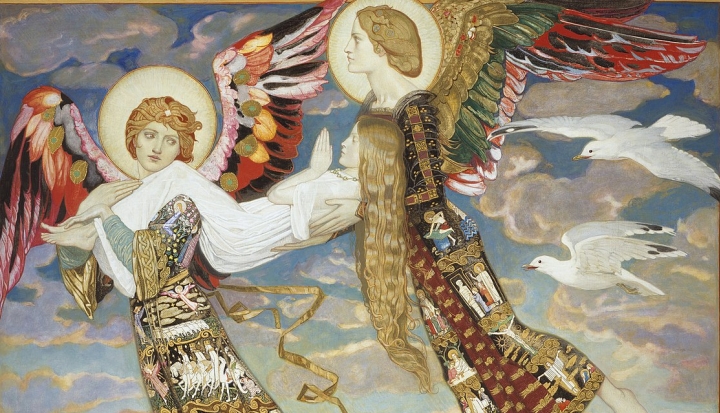
St. Brigid of Ireland
Born: c. 451 CE
Died: c. 525 CE
Feast: February 1
Patron of: babies, midwives, children born into abusive families, nuns, poets, scholars, travelers
Saint Brigid didn’t go in for streets of gold or angelic harps in her vision of heaven. Instead it went something like this: “I should like a great lake of beer for the King of Kings. I should like the angels of Heaven to be drinking it through time eternal.” And it ended like this: “I should like the people of Heaven, the poor, to be gathered around us from all parts.”
Brigid’s character shines through these lines from a poem attributed to her. Brigid’s compassion ran like a mighty river; her generosity knew no bounds. She would give the shirt off her back and the food from her table—and probably the food from your table, too, if you happened to live in the neighborhood.
Brigid was born to a Christian enslaved woman owned by the chieftain Dubthach around the year 450. Her giving ways soon began to get her into trouble with her pagan father, and for good reason. Brigid doled out with abundance whatever happened to be on hand, all of which belonged to her father: milk, butter, and bacon from the kitchen; wool from the newly sheared sheep; a lamb or a sheep or a cow from the fields. Biographer Mary Purcell writes, “One beggar returned under different disguises seven times in one day, and was a shepherd of seven sheep that evening.”
When Dubthach had lost his last ounce of patience with his daughter’s freehandedness, he decided to try to unload her on the king of Leinster, a baptized Christian like Brigid. Taking her along in his chariot, he instructed her to wait while he visited the king.
Along came a leper begging for alms, and Brigid had nothing to hand him but her father’s most magnificent battle sword, entrusted to her in his absence. Upon his return the furious Dubthach dragged his daughter before the king, raging about this latest folly. “But when the king questioned her,” writes Mary Reed Newland in The Saint Book, “Brigid answered simply that a priceless gift was never unsuitable as a gift to God.” The king sent them away, saying to Dubthach, “Leave her alone, for her merit before God is greater than ours.”
When her father then lined up a handsome young poet to marry his daughter, Brigid politely declined and promptly persuaded a friend of hers to marry the rejected suitor. Brigid had decided to consecrate her life to God, even though no monasteries for women had existed in Ireland up to that time. She found seven women who shared her vision and together they went to the local bishop, who named Brigid to head the new convent.
This monastery at Kildare became one of the great centers of learning in Ireland. It offered the women of Ireland an unheard-of opportunity to develop their talents along with their holiness: copying manuscripts; crafting liturgical objects; learning about history, literature, and faith. Brigid soon established convents all over Ireland. Despite her fame and power as abbess (heads of monasteries had far more clout than bishops in the Irish church), she would often be found milking the cows, making butter and cheese, and brewing tubs of ale for the abbey’s many guests.
Her generosity to the needy continued unabated. Once when a feast had been prepared for some visiting prelates, a few beggars came knocking. Of course the beggars got the feast, the bishops the leftovers, and the nuns got sore at Brigid, who probably got a great big kick out of the whole thing.
Originally published in the March 1992 issue of Salt magazine, ©Claretian Publications.
More about St. Brigid:
St. Brigid: The other Irish saint
Raise a pint and air out your linens—St. Brigid is coming.
Saint Brigid offers healing for today’s divided world
How an ancient Irish saint confronts injustice, teaches peace, and offers hope for today’s troubled times.
Image: Wikimedia Commons






